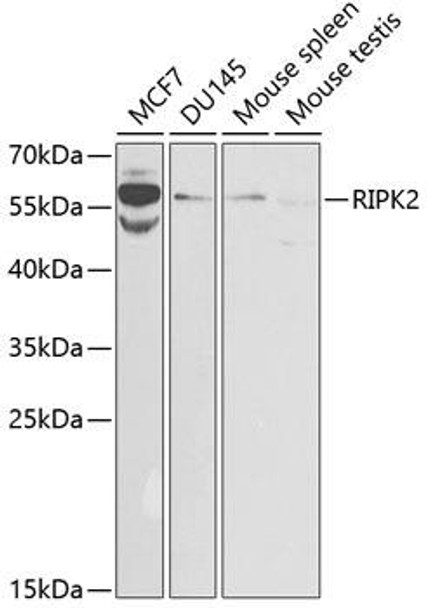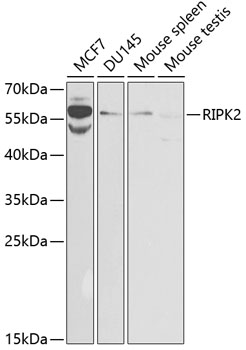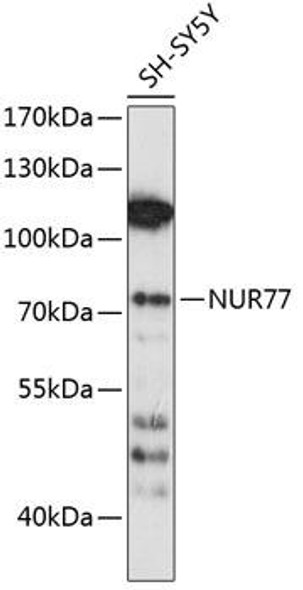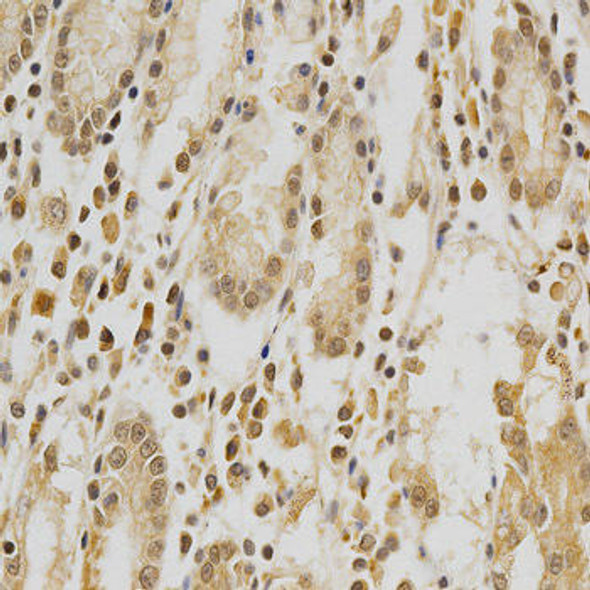Description
Anti-RIPK2 Antibody (CAB2498)
The RIPK2 Polyclonal Antibody (CAB2498) is a valuable tool for researchers studying the receptor-interacting serine/threonine-protein kinase 2 (RIPK2), a key player in the regulation of immune and inflammatory responses. This antibody, produced in rabbits, is highly specific to human samples and has been validated for use in Western blot applications.RIPK2 is a crucial signaling molecule involved in the activation of NF-κB and MAPK pathways following microbial infection, making it a critical target for research in immunology and infectious diseases. By binding to RIPK2, this antibody enables the detection and analysis of RIPK2 protein levels in various cell types, allowing for in-depth studies on the role of RIPK2 in immune signaling pathways.
Understanding the function of RIPK2 is essential for developing new therapies for inflammatory and infectious diseases, as dysregulation of RIPK2 signaling has been implicated in various inflammatory conditions, including inflammatory bowel disease, arthritis, and autoimmune disorders. By using the RIPK2 Polyclonal Antibody, researchers can gain valuable insights into the mechanisms underlying immune responses and potentially identify new targets for therapeutic intervention.
| Antibody Name: | Anti-RIPK2 Antibody |
| Antibody SKU: | CAB2498 |
| Antibody Size: | 20uL, 50uL, 100uL |
| Application: | WB |
| Reactivity: | Human, Mouse, Rat |
| Host Species: | Rabbit |
| Immunogen: | Recombinant fusion protein containing a sequence corresponding to amino acids 1-540 of human RIPK2 (NP_003812.1). |
| Application: | WB |
| Recommended Dilution: | WB 1:500 - 1:2000 |
| Reactivity: | Human, Mouse, Rat |
| Positive Samples: | MCF7, DU145, Mouse spleen, Mouse testis |
| Immunogen: | Recombinant fusion protein containing a sequence corresponding to amino acids 1-540 of human RIPK2 (NP_003812.1). |
| Purification Method: | Affinity purification |
| Storage Buffer: | Store at -20'C. Avoid freeze / thaw cycles. Buffer: PBS with 0.02% sodium azide, 50% glycerol, pH7.3. |
| Isotype: | IgG |
| Sequence: | MNGE AICS ALPT IPYH KLAD LRYL SRGA SGTV SSAR HADW RVQV AVKH LHIH TPLL DSER KDVL REAE ILHK ARFS YILP ILGI CNEP EFLG IVTE YMPN GSLN ELLH RKTE YPDV AWPL RFRI LHEI ALGV NYLH NMTP PLLH HDLK TQNI LLDN EFHV KIAD FGLS KWRM MSLS QSRS SKSA PEGG TIIY MPPE NYEP GQKS RASI KHDI YSYA VITW EVLS RKQP FEDV TNPL QIMY SVSQ GHRP VINE ESLP YDIP HRAR MISL IESG WAQN PDER PSFL KCLI ELEP VLRT FEEI TFLE AVIQ LKKT KLQS VSSA IHLC DKKK MELS LNIP VNHG PQEE SCGS SQLH ENSG SPET SRSL PAPQ DNDF LSRK AQDC YFMK LHHC PGNH SWDS TISG SQRA AFCD HKTT PCSS AIIN PLST AGNS ERLQ PGIA QQWI QSKR EDIV NQMT EACL NQSL DALL SRDL IMKE DYEL VSTK PTRT SKVR QLLD TTDI QGEE FAKV IVQK LKDN KQMG LQPY PEIL VVSR SPSL NLLQ NKSM |
| Gene ID: | 8767 |
| Uniprot: | O43353 |
| Cellular Location: | Cytoplasm |
| Calculated MW: | 45kDa/61kDa |
| Observed MW: | 61kDa |
| Synonyms: | RIPK2, CARD3, CARDIAK, CCK, GIG30, RICK, RIP2 |
| Background: | This gene encodes a member of the receptor-interacting protein (RIP) family of serine/threonine protein kinases. The encoded protein contains a C-terminal caspase activation and recruitment domain (CARD), and is a component of signaling complexes in both the innate and adaptive immune pathways. It is a potent activator of NF-kappaB and inducer of apoptosis in response to various stimuli. |
| UniProt Protein Function: | RIPK2: a tyrosine kinase-like kinase of the RIPK family. Activates pro-caspase-1 and pro-caspase-8. Potentiates casp-8-mediated apoptosis. May activate NF-kappaB. |
| UniProt Protein Details: | Protein type:EC 2.7.11.1; Kinase, protein; EC 2.7.10.2; Protein kinase, Ser/Thr (non-receptor); Protein kinase, TKL; TKL group; RIPK family Chromosomal Location of Human Ortholog: 8q21 Cellular Component: cytoplasm; cytoskeleton; cytosol; protein complex; vesicle Molecular Function:ATP binding; CARD domain binding; LIM domain binding; non-membrane spanning protein tyrosine kinase activity; protein binding; protein homodimerization activity; protein serine/threonine kinase activity; receptor binding; signal transducer activity Biological Process: activation of MAPK activity; activation of NF-kappaB transcription factor; adaptive immune response; apoptosis; defense response to Gram-positive bacterium; I-kappaB kinase/NF-kappaB cascade; inflammatory response; innate immune response; JNK cascade; lipopolysaccharide-mediated signaling pathway; MyD88-dependent toll-like receptor signaling pathway; MyD88-independent toll-like receptor signaling pathway; negative regulation of apoptosis; nerve growth factor receptor signaling pathway; peptidyl-tyrosine phosphorylation; positive regulation of alpha-beta T cell proliferation; positive regulation of apoptosis; positive regulation of chemokine production; positive regulation of cytokine and chemokine mediated signaling pathway; positive regulation of I-kappaB kinase/NF-kappaB cascade; positive regulation of immature T cell proliferation; positive regulation of interferon-alpha production; positive regulation of interferon-beta production; positive regulation of interferon-gamma production; positive regulation of interleukin-12 production; positive regulation of interleukin-2 production; positive regulation of interleukin-6 production; positive regulation of JNK cascade; positive regulation of peptidyl-serine phosphorylation; positive regulation of peptidyl-tyrosine phosphorylation; positive regulation of protein ubiquitination; positive regulation of T-helper 1 cell differentiation; positive regulation of transcription from RNA polymerase II promoter; positive regulation of tumor necrosis factor production; response to exogenous dsRNA; signal transduction; stress-activated MAPK cascade; T cell proliferation; T cell receptor signaling pathway; toll-like receptor 10 signaling pathway; toll-like receptor 2 signaling pathway; toll-like receptor 3 signaling pathway; toll-like receptor 4 signaling pathway; toll-like receptor 5 signaling pathway; toll-like receptor 9 signaling pathway; toll-like receptor signaling pathway |
| NCBI Summary: | This gene encodes a member of the receptor-interacting protein (RIP) family of serine/threonine protein kinases. The encoded protein contains a C-terminal caspase activation and recruitment domain (CARD), and is a component of signaling complexes in both the innate and adaptive immune pathways. It is a potent activator of NF-kappaB and inducer of apoptosis in response to various stimuli. [provided by RefSeq, Jul 2008] |
| UniProt Code: | O43353 |
| NCBI GenInfo Identifier: | 20455217 |
| NCBI Gene ID: | 8767 |
| NCBI Accession: | O43353.2 |
| UniProt Secondary Accession: | O43353,Q6UWF0, B7Z748, |
| UniProt Related Accession: | O43353 |
| Molecular Weight: | 45,582 Da |
| NCBI Full Name: | Receptor-interacting serine/threonine-protein kinase 2 |
| NCBI Synonym Full Names: | receptor interacting serine/threonine kinase 2 |
| NCBI Official Symbol: | RIPK2 |
| NCBI Official Synonym Symbols: | CCK; RICK; RIP2; CARD3; GIG30; CARDIAK |
| NCBI Protein Information: | receptor-interacting serine/threonine-protein kinase 2 |
| UniProt Protein Name: | Receptor-interacting serine/threonine-protein kinase 2 |
| UniProt Synonym Protein Names: | CARD-containing interleukin-1 beta-converting enzyme-associated kinase; CARD-containing IL-1 beta ICE-kinase; RIP-like-interacting CLARP kinase; Receptor-interacting protein 2; RIP-2; Tyrosine-protein kinase RIPK2 (EC:2.7.10.2) |
| Protein Family: | Putative zinc metalloprotease |
| UniProt Gene Name: | RIPK2 |
| UniProt Entry Name: | RIPK2_HUMAN |





